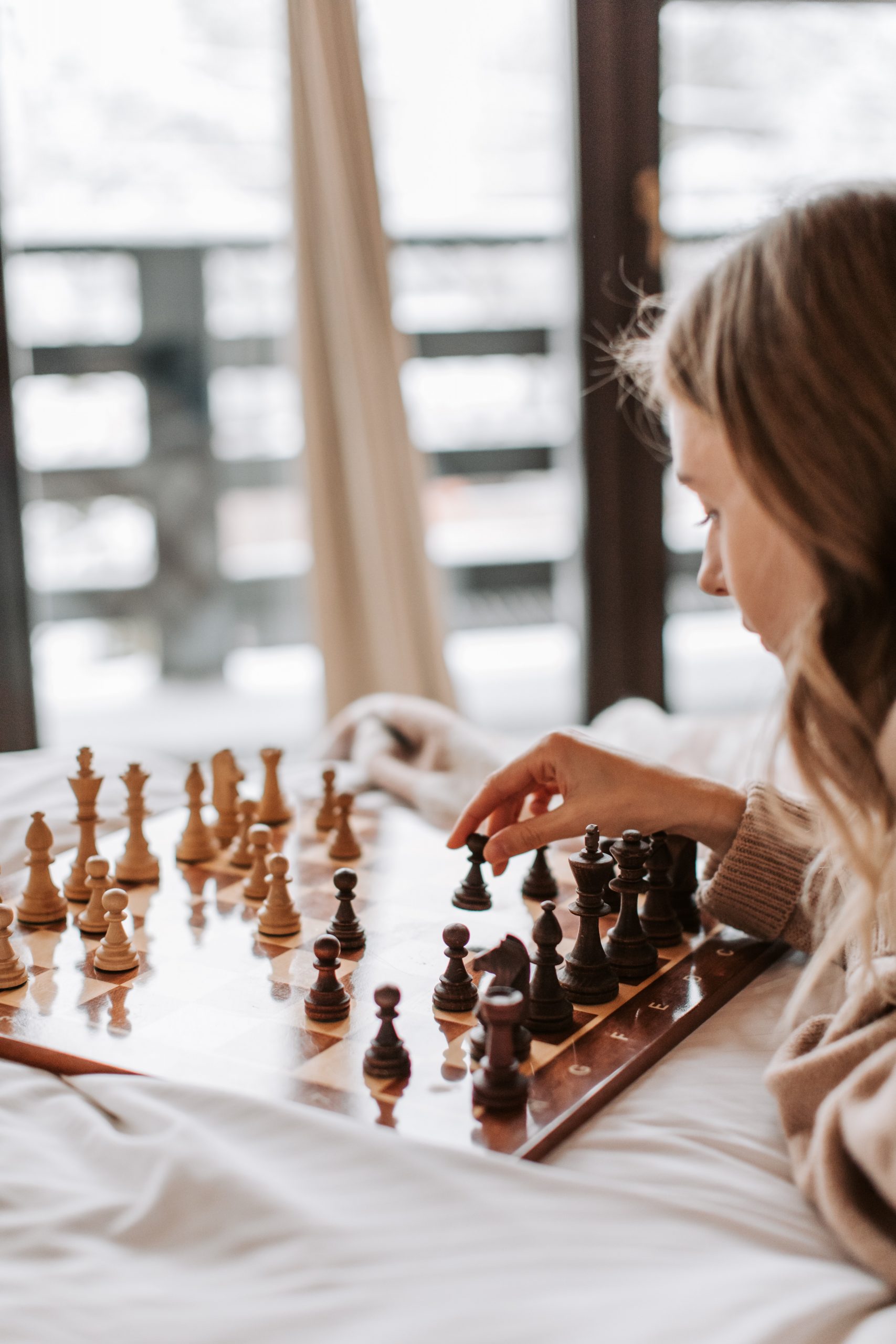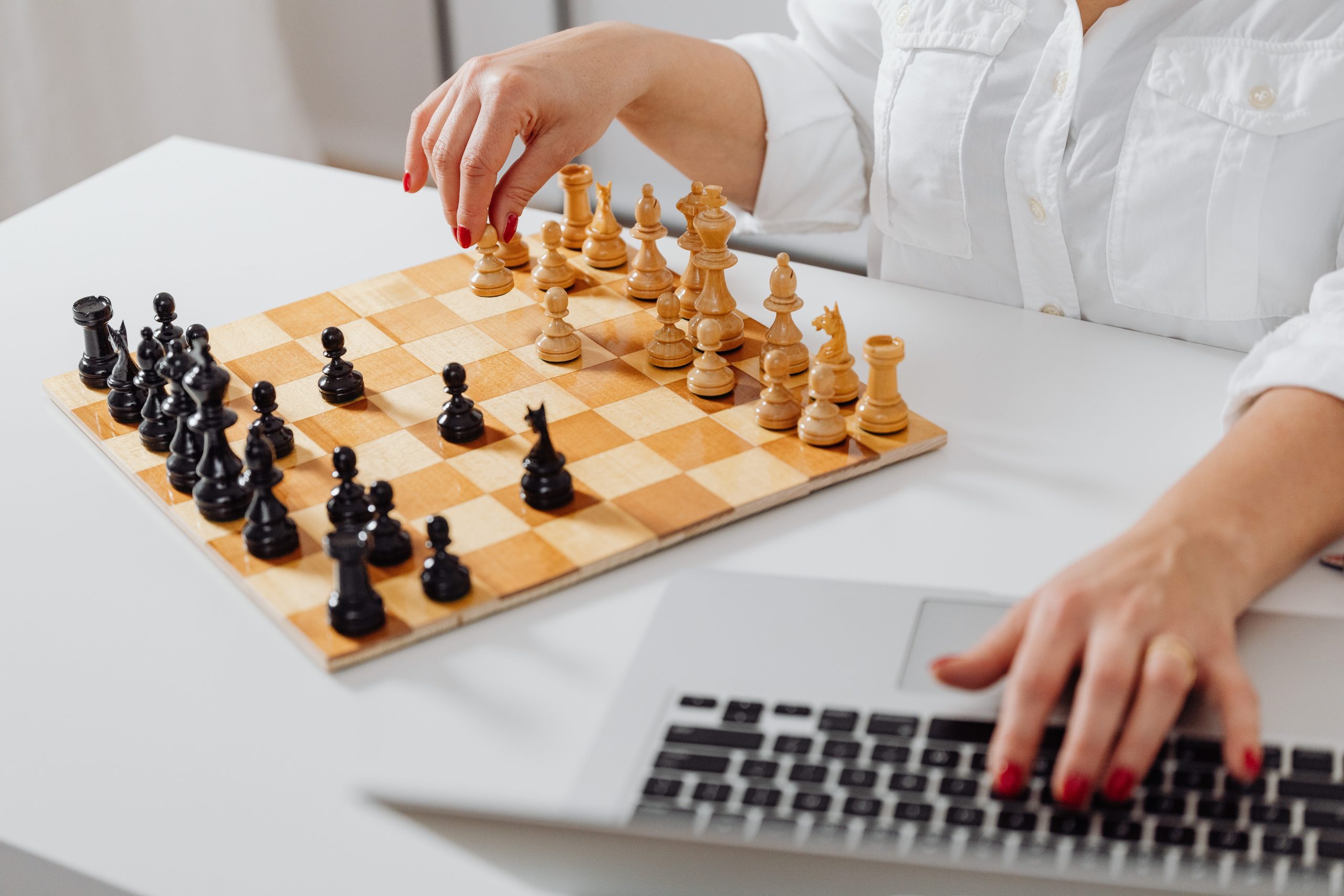
What are the steps to become a strong chess player? Everyone wants to know a secret method for quickly becoming a chess master! Is it necessary for you to focus on tactics? What percentage of your time should you devote to endgames? Do you have to play chess on the table? We’ll address these and other questions, as well as provide you with a clear 10-step plan detailing the most crucial elements to mastering chess.
Step 1: Solve Tactics on a Daily Basis
Starting to solve tactics is perhaps one of the most significant moves you can take to improve your game. While working on tactics, there are a few things to bear in mind. First and foremost, you should not devote the entire training session to it. It is entirely sufficient to devote 15-20 minutes per day to this activity.
Choose problems that you can solve fast. The problem is too difficult if it takes you 30 minutes to locate a single solution. Finding all of the important lines and variations should take no more than 2-3 minutes per challenge.
You’ll be able to solve 7-10 problems per day this manner. It may not appear to be a lot, but it adds up to 70 difficulties per week, 300 problems per month, and 4500 problems each year. That’s a solid starting point, and it’ll help you find most combinations.
Step 2: Play Chess in a Competitive Environment
Practice is the second most crucial stage in improving your chess skills. The most common blunder made by amateur players is to believe that playing online chess is sufficient. Online chess can serve as a temporary substitute for traditional chess. A true face-to-face competition, on the other hand, is required to completely concentrate on the game and perform at your best.
Even when playing practice matches, the value gained from over-the-board games cannot be compared to that gained from online chess. There are no GMs and IMs who rose to prominence through online chess. They play online for entertainment rather than serious training. Always choose over-the-board if you want to get the most out of your practice matches! That’s all there is to it.
Step 3: Compile a list of all of your losses.
One of the most significant components of improving at chess is analyzing lost games. Many amateur players would rather either not study their games at all or only focus on the wins. Unfortunately, we cannot learn from the mistakes of others.
We learn the most from our own experiences. It’s 1000 times more efficient to touch a hot plate once and get burned than it is to be informed 100 times that touching a hot plate is bad. It operates the same way in chess. You’ll be wary and avoid future accidents if you miss a back rank mate once or twice.
By studying your lost games, you’ll be able to figure out what went wrong and do everything you can to prevent it from happening again in the future. It’s difficult to look at your defeats, but it’s the only way to improve your chess skills.

Step 4: Learn about Grandmaster Games.
What are the benefits of studying grandmaster games? Analyzing the games of highly strong players teaches you a lot of concepts and strategies that are nearly hard to find on your own.
When reviewing the GM games, there are a few factors to bear in mind. First and foremost, you should examine well-annotated games and try to comprehend why certain moves were made. Take a proactive approach to the game. Put yourself in the shoes of the player, identify all threats, devise a strategy, and then compare your findings and analyses to what transpired in the game.
Active learning is unquestionably preferable to merely reading annotations. While reviewing grandmaster games, make your brain work, and it will do the same in your own games.
Step 5: Make Good Use of Technology
Chess technology today is incredible. World Champions can be readily defeated by certain motors. Software exists that stores millions of chess games dating back to the 1200s. There are systems that can analyze games for you in order to help you figure out what went wrong and when it happened. This technology is responsible for the production of 12- and 13-year-old GMs, which would have seemed unthinkable 20-30 years ago. Technology, on the other hand, will not help you. It isn’t a replacement for hard work.
Many chess players cut corners by analyzing their games exclusively with computers, obviating the need for human intervention. You won’t be able to figure out why such errors were committed with the help of a machine. It is unable to teach you how to prevent them in the future. It is critical to thoroughly examine all of your games before consulting an engine.
Because it is convenient to acquire the analyses without doing the tough lifting, players become strongly attached to the engines. You don’t have to think; in a matter of seconds, you’ll be presented the correct move and continuation. Part of the credit for assessing certain positions is wrongly attributed to the players. After a while, individuals begin to believe they can locate the move without the assistance of the computer. In over-the-board games, the computer will not assist you. You’re completely alone. As a result, you must learn to locate those movements on your own. And in order to do so, you must learn to analyze without the aid of a machine.

Step 6: Enlist the help of a mentor.
This is a crucial step that will greatly expedite your success. This is something to think about if you want to get skilled at chess quickly. Remember that a chess mentor is not the same as a chess coach. He won’t offer you any homework or assignments. A chess mentor is someone with whom you can discuss your game. You can tell him about your struggles, as well as your triumphs and disappointments. You have the authority to tell him what works and what doesn’t. You are welcome to seek his advice.
Your tutor should, ideally, be a better chess player than you. He doesn’t have to be a Grandmaster or even a master player to be successful. However, he should have greater experience and be able to provide you with sound advise.
Step 7: Stick to the 20/40/40 Rule
If you want to improve your game, you should work on all aspects of it. Many players make the mistake of concentrating solely on some aspects of chess while entirely overlooking the others. The 20/40/40 rule comes in help in this situation. It makes reasonable for an under 2000 rated player to devote 20% of his attention to openings, 40% to the middlegame, and 40% to the endgame.
You should also play practice games, solve tactical problems, and analyze. If one aspect of your game appears to be lagging, you can devote a little more time to it, but never disregard the other parts!
Step 8: Create a Chess Collection
If you want to improve your chess skills, you’ll need a chess library. Strong chess players have a library of information that they study and consult on a regular basis. You might come across a Middlegame position that you’ve seen in one of our instructional films, for example.
Then, to refresh your memory, re-watch the section of the video that discusses that Middlegame. You can also go through some of the lessons from the 21-Day Course again (assuming you already completed the course). Building a library is, in any case, a crucial phase in a chess player’s career. If you haven’t already, you should consider adding some of our fantastic materials to your library!
Step 9: Maintain a positive attitude
If you want to improve at chess, it’s critical to maintain an optimistic attitude. Failures should not be viewed as a source of frustration; instead, they should be viewed as a necessary part of the learning process.
It is far preferable to lose a few more games now than to lose a crucial game later when it matters most. If you start to have negative thoughts, simply say “STOP,” take a deep breath, and concentrate on getting the results you want!
Step 10: Teach Others to Play Chess
Training other chess players is a great way to chess openings for adult chess improvers. By sharing your knowledge and explaining concepts to others, you begin to grasp it on a much deeper level.
Teaching others necessitates an in-depth knowledge of the subject. You may need to review some of the material in order to formulate the thoughts in a clear, easy-to-understand manner. But once you do, you’ll be shocked at how much better your chess becomes. You will one day become a chess master by assisting other players in mastering the game!
You must have a defined study strategy if you want to increase your chess skill. If you want to advance dramatically at chess, you must focus on all of the game’s features in a methodical manner:
- tactics
- positional play
- attacking skills
- endgame technique
- classical games analysis
- psychological preparation
- and much more…
